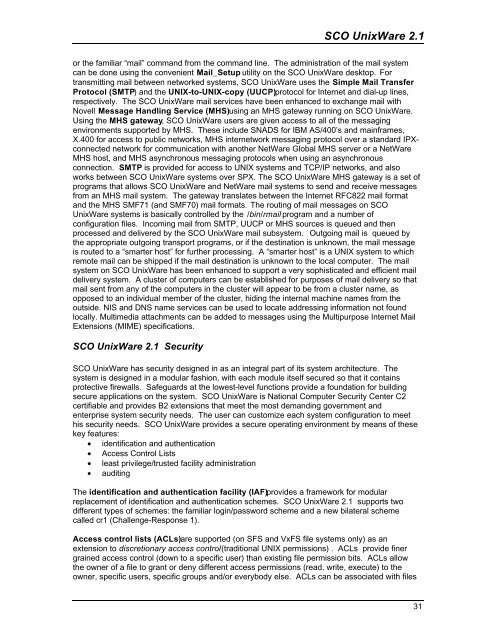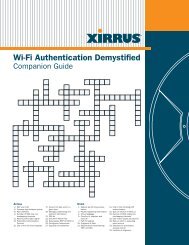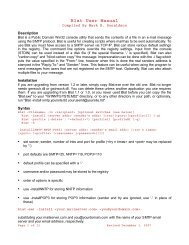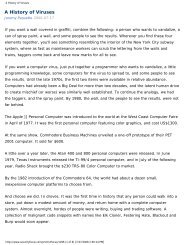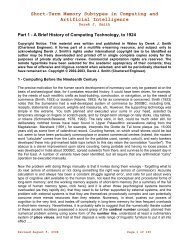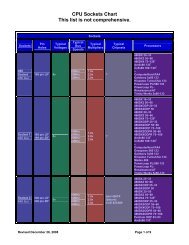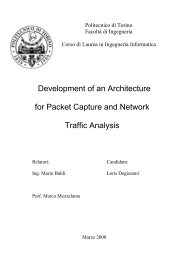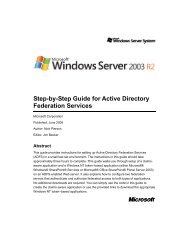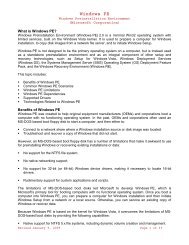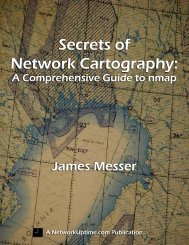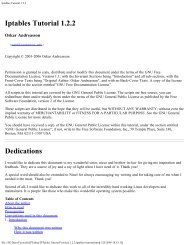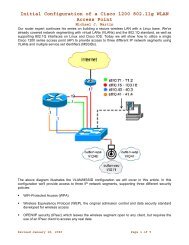SCO UnixWare 2.1 Technical Summary - Bandwidthco Computer ...
SCO UnixWare 2.1 Technical Summary - Bandwidthco Computer ...
SCO UnixWare 2.1 Technical Summary - Bandwidthco Computer ...
You also want an ePaper? Increase the reach of your titles
YUMPU automatically turns print PDFs into web optimized ePapers that Google loves.
<strong>SCO</strong> <strong>UnixWare</strong> <strong>2.1</strong><br />
or the familiar “mail” command from the command line. The administration of the mail system<br />
can be done using the convenient Mail_Setup utility on the <strong>SCO</strong> <strong>UnixWare</strong> desktop. For<br />
transmitting mail between networked systems, <strong>SCO</strong> <strong>UnixWare</strong> uses the Simple Mail Transfer<br />
Protocol (SMTP) and the UNIX-to-UNIX-copy (UUCP) protocol for Internet and dial-up lines,<br />
respectively. The <strong>SCO</strong> <strong>UnixWare</strong> mail services have been enhanced to exchange mail with<br />
Novell Message Handling Service (MHS) using an MHS gateway running on <strong>SCO</strong> <strong>UnixWare</strong>.<br />
Using the MHS gateway, <strong>SCO</strong> <strong>UnixWare</strong> users are given access to all of the messaging<br />
environments supported by MHS. These include SNADS for IBM AS/400’s and mainframes,<br />
X.400 for access to public networks, MHS internetwork messaging protocol over a standard IPXconnected<br />
network for communication with another NetWare Global MHS server or a NetWare<br />
MHS host, and MHS asynchronous messaging protocols when using an asynchronous<br />
connection. SMTP is provided for access to UNIX systems and TCP/IP networks, and also<br />
works between <strong>SCO</strong> <strong>UnixWare</strong> systems over SPX. The <strong>SCO</strong> <strong>UnixWare</strong> MHS gateway is a set of<br />
programs that allows <strong>SCO</strong> <strong>UnixWare</strong> and NetWare mail systems to send and receive messages<br />
from an MHS mail system. The gateway translates between the Internet RFC822 mail format<br />
and the MHS SMF71 (and SMF70) mail formats. The routing of mail messages on <strong>SCO</strong><br />
<strong>UnixWare</strong> systems is basically controlled by the /bin/rmail program and a number of<br />
configuration files. Incoming mail from SMTP, UUCP or MHS sources is queued and then<br />
processed and delivered by the <strong>SCO</strong> <strong>UnixWare</strong> mail subsystem. Outgoing mail is queued by<br />
the appropriate outgoing transport programs, or if the destination is unknown, the mail message<br />
is routed to a “smarter host” for further processing. A “smarter host” is a UNIX system to which<br />
remote mail can be shipped if the mail destination is unknown to the local computer. The mail<br />
system on <strong>SCO</strong> <strong>UnixWare</strong> has been enhanced to support a very sophisticated and efficient mail<br />
delivery system. A cluster of computers can be established for purposes of mail delivery so that<br />
mail sent from any of the computers in the cluster will appear to be from a cluster name, as<br />
opposed to an individual member of the cluster, hiding the internal machine names from the<br />
outside. NIS and DNS name services can be used to locate addressing information not found<br />
locally. Multimedia attachments can be added to messages using the Multipurpose Internet Mail<br />
Extensions (MIME) specifications.<br />
<strong>SCO</strong> <strong>UnixWare</strong> <strong>2.1</strong> Security<br />
<strong>SCO</strong> <strong>UnixWare</strong> has security designed in as an integral part of its system architecture. The<br />
system is designed in a modular fashion, with each module itself secured so that it contains<br />
protective firewalls. Safeguards at the lowest-level functions provide a foundation for building<br />
secure applications on the system. <strong>SCO</strong> <strong>UnixWare</strong> is National <strong>Computer</strong> Security Center C2<br />
certifiable and provides B2 extensions that meet the most demanding government and<br />
enterprise system security needs. The user can customize each system configuration to meet<br />
his security needs. <strong>SCO</strong> <strong>UnixWare</strong> provides a secure operating environment by means of these<br />
key features:<br />
• identification and authentication<br />
• Access Control Lists<br />
• least privilege/trusted facility administration<br />
• auditing<br />
The identification and authentication facility (IAF) provides a framework for modular<br />
replacement of identification and authentication schemes. <strong>SCO</strong> <strong>UnixWare</strong> <strong>2.1</strong> supports two<br />
different types of schemes: the familiar login/password scheme and a new bilateral scheme<br />
called cr1 (Challenge-Response 1).<br />
Access control lists (ACLs) are supported (on SFS and VxFS file systems only) as an<br />
extension to discretionary access control (traditional UNIX permissions) . ACLs provide finer<br />
grained access control (down to a specific user) than existing file permission bits. ACLs allow<br />
the owner of a file to grant or deny different access permissions (read, write, execute) to the<br />
owner, specific users, specific groups and/or everybody else. ACLs can be associated with files<br />
31


